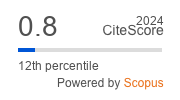The Effect of Additives on the Properties of Bismuth Mn—Zn–ferrite
https://doi.org/10.17073/1609-3577-2014-2-99-103
Abstract
Ferrite−ceramic materials are widely used in electronics. The most widely used is Mn—Zn−ferrite due to its high permeability. However, Mn—Zn−ferrites obtained by the standard process flow (ITS) have the texture along the pressing axis which significantly reduces their permeability and causes anisotropic properties. The difference in the magnetic permeability along and perpendicular to the pressing axis reaches 10—20 % due to the texture. The texture of the raw blanks is caused by lamellar ferrite particles [1] and the orientation of the [111] crystallographic axes along the compression axis. During sintering the degree of texture increases due to the preferential growth of pressing−oriented particles at the expense of non−oriented ones. As a result, an easy magnetization axis formed in the sintered ferrite which coincides with the compression axis. Most sizes of ferrite products are manufactured in such a way that the magnetic field lines in their operation do not coincide with the compression axis (ring, P−and R−core), which significantly reduces their operating parameters. To reduce the texture in this study we used a short process flow diagram including only one heat treatment i.e. sintering of the blanks pressed directly from the mixture of the raw ferrite oxide particles that are oriented but slightly when pressed. We show that isotropic Mn—Zn−ferrite with the desired magnetic properties at CCC can be obtained using bismuth oxide additives and a complex composition of binder during compaction instead conventionally used polyvinyl alcohol.
About the Authors
I. I. KanevaRussian Federation
Cand. Sci. (Eng.), Associate Professor;
V. G. Kostishin
Russian Federation
Dr. Sci. (Phys.–Math.), Associate Professor, Head of Chair «Technology of Materials of Electronics»;
V. G. Andreev
Russian Federation
Dr. Sci. (Eng.), Professor
A. N. Nikolaev
Russian Federation
technologist
E. I. Volkova
Russian Federation
References
1. Анциферов, В. Н. Проблемы порошкового материаловедения / В. Н. Анциферов, Л. М. Летюк, В. Г. Андреев, А. Н. Дубров, А. В. Гончар, В. Г. Костишин, А. И. Сатин. // Части IV, V. − Екатеринбург : УрО РАН, 2005. − 394 с., 407 с.
2. Костишин, В. Г. Влияние добавок на микроструктуру и свойствамарганец−цинковогоферрита/В.Г.Костишин,В. Г. Андреев, И. И. Канева, А. Н. Николаев, Е. И. Лысенко // Перспективные технологии, оборудование и аналитические системы для материаловедения и наноматериалов. Тр. VIII Междунар. конф. − Алматы, 2011. − С. 421—427.
3. Горелик, С. С. Формирование микроструктуры и свойств ферритов в процессе рекристаллизации / С. С. Горелик, Э. А. Бабич, Л. М. Летюк − М. : Металлургия, 1984. − C. 505—509.
4. Дугар−Жабон,К.Д./К.Д.Дугар−Жабон.//Изв.АНСССР. Неорганич. материалы. − 1972. − Т. 8, No 3.
5. Левин, Б. Е. Физико−химические основы получения, свойства и применение ферритов / Б. Е. Левин, Ю. Д. Третьяков, Л. М. Летюк. − М. : Металлургия, 1979. − 471 с.
6. Летюк,Л.М.Химияитехнологияферритов/Л.М.Летюк, Г. И. Журавлев − Ленинград, Химия 1983. − 256 с.
7. Справочник «Ферриты и магнитодиэлектрики» / Под ред. Н. Д. Горбунова, Г. А. Матвеева − М. : Советское радио, 1969. − 165 с.
8. Костишин, В. Г. Исследование возможности получения феррита марки 2000НМ по короткой технологической схеме / В. Г. Костишин, В. Г. Андреев, И. И. Канева, А. Н. Николаев, Е. И. Волкова // Изв. вузов. Материалы электрон. техники. − 2013. − No 1. – С. 23—27.
Review
For citations:
Kaneva I.I., Kostishin V.G., Andreev V.G., Nikolaev A.N., Volkova E.I. The Effect of Additives on the Properties of Bismuth Mn—Zn–ferrite. Izvestiya Vysshikh Uchebnykh Zavedenii. Materialy Elektronnoi Tekhniki = Materials of Electronics Engineering. 2014;(2):99-103. (In Russ.) https://doi.org/10.17073/1609-3577-2014-2-99-103
JATS XML





































